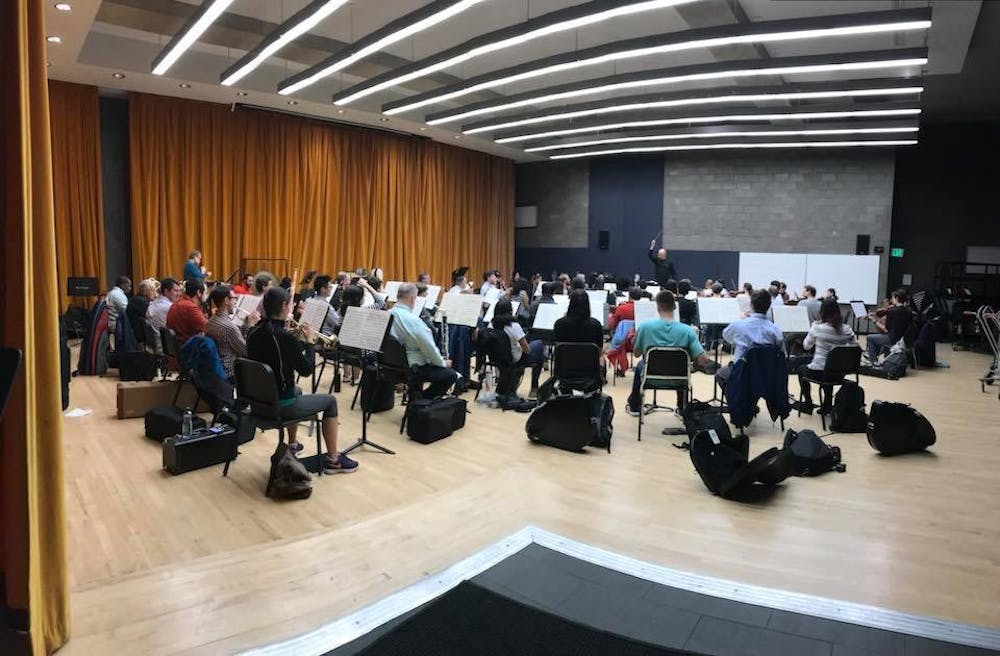On Saturday, March 5, The Hopkins Symphony Orchestra took a leap in a new, more modern direction by introducing a new element to the classical concerts they are known for: beatboxing.
The Hopkins Symphony Orchestra is a group composed of students, alumni, faculty and musicians from the community.
Together, this collection of musicians forms a full orchestra with the goal of combining their unique backgrounds and experiences to bring music to the Hopkins area.
Their concerts are free for Hopkins students and cost $12 dollars for Hopkins faculty, staff, and alumni, as well as for the general public.
Due to the construction currently underway in Shriver Hall, the group’s performances have been relocated to the Bunting Meyerhoff Interfaith and Community Service Center, just across from the tennis courts on Homewood Campus.
This performance began as expected, with a performance of the “Rosamunde Overture” by Franz Schubert. It was beautifully played, with the members of the orchestra clearly attuned to each other and the conductor.
It was clear that this group put in the effort and hours of work required to play such a piece.
The next pieces were “Overture” and “Dance of the Comedians” from The Bartered Bride by Bedřich Smetana, a Czech composer to those less familiar with the classical music scene.
The pieces were again beautifully played by the orchestra, and this was the point when they introduced Shodekeh’s beatboxing.
Shodekeh is a musical accompanist that specializes in beatboxing and vocal percussion. He is a faculty member and accompanist at Towson University’s Department of Dance and at Duke University’s American Dance Festival.
At the beginning of his songs with the Orchestra, he was less than impressive. Barely audible, he made almost solely swooshing sounds, which didn’t seem very well-rehearsed.
Additionally, Shodekeh was not keeping the same time as the conductor, and the disparity was noticeable.
However, as the piece continued, he picked up the pace and added extra sounds and more complicated rhythms and styles to his performance.
By the time “Overture” was over, the audience, which had initially been uncertain of what to make of Shodekeh’s performance, was less uncomfortable. Rather, they had clearly perked up and were engaged for the remainder of his time on stage.
The beatboxing solo that Shodekeh performed between pieces is what made his performance truly worthwhile. Shodekeh showed off his range and ability to mimic more than just the wind, a highlight being when he imitated a record scratching.
A smooth transition from this solo into the next piece where he collaborated with the Orchestra solidified his aptitude for music and allowed his true abilities to show through.
He continued into “Dance of the Comedians” with confidence, further displaying his skill.
What had started off as a rocky performance turned into a pleasant and interesting set combining the classical and the modern in a refreshing way.
There was a brief intermission after Shodekeh finished his performance.
When the audience returned, the Orchestra closed with “Symphony No. 7 in D Minor Op 70” by Antonín Dvořák, another lesser-known name typically reserved for those with orchestral backgrounds.
This piece was longer than I personally bargained for. It felt like the concert began to drag a bit towards the end. Still, there is clearly great talent among the players in the Orchestra.
The night lasted about two hours in total, minus the discussion with Max Derrickson, Jed Gaylin and Shodekeh that preceded the concert.
The next and final performance by the Hopkins Symphony Orchestra for the 2017-18 season is scheduled for Sunday, April 29 at 3 p.m. It will again be located at the Bunting Meyerhoff Interfaith and Community Service Center.
For the student looking to spend an afternoon listening to well-rehearsed, complex orchestral music, I highly recommend attending their next concert.
There will not be beatboxing at this event, which, based on their struggle to effectively blend the two styles, seems like it will be a plus.
While joining forces with Shodekeh was a valiant effort to attract more people to their concert, the Hopkins Symphony Orchestra is better off focusing on their area of specialty and playing what they usually do — classical music.





